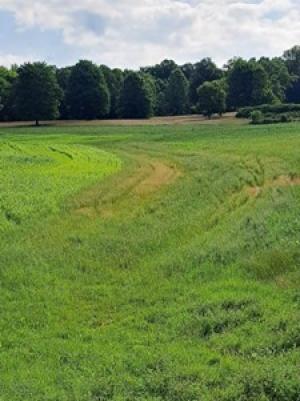JR Twentier Farms Work With NRCS to Stop Erosion

Using the Environmental Quality Incentives Program (EQIP) financial assistance program, Jeff installed five grassed waterways, a field border, and is now planting cover crops.
By: Alex Smerkar and Hannah Durkin, NRCS
JR Twentier Farms is in the southeast corner of Lawrence County in the small town of Portersville. The main farm is roughly 180 acres and borders a state park with a history of coal mining. Operator Jeff Twentier is a fifth-generation farmer on this hilly landscape. With steep grounds and the past disturbance of coal mining, Jeff has faced challenges when trying to grow crops and make hay.

Jeff grows corn silage as feed for his herd of beef cattle. He also grows corn for grain, soybeans, small grains, and hay. He tries to establish all his crops using no-till, although occasional disking is necessary in areas with ruts. Crops are planted on the contour and even in strips through some areas to help prevent erosion. Even with all these good practices, Jeff still had some erosion problems. In a few places across the farm concentrated flow was causing gullies to wash sediment and debris from his fields. Small amounts of sheet and rill erosion were observed at the bottom slopes. Seeing these issues and wanting to make sure he was keeping his fields in good condition; he contacted USDA’s Natural Resources Conservation Service (NRCS) for assistance after asking the Farm Service Agency (FSA) office about programs that would be beneficial for him.
Working with Jeff, NRCS was able to come up with a plan to implement practices to address and prevent erosion. When asked about any unexpected challenges that he faced once the project began, Jeff said that “the biggest challenge was deciding how to space projects out. Specifically with handling cover crops, it was a process to remind myself to not bite off more than I can chew.”
Using the Environmental Quality Incentives Program (EQIP) financial assistance program Jeff installed five grassed waterways, a field border, and is now planting cover crops. These installed practices addressed gully erosion formed by concentrated flow and sediment transported by sheet and rill erosion. He benefits greatly from these practices as he can plant on the contour across the grassed waterways. Jeff spoke about what he believed made the process a success and said, “Every project was addressed, and all issues were solved with open communication and collaboration between NRCS and I.”
Jeff is excited to finish his EQIP contract by planting cover crops and maintaining already installed practices. He talks about his hopes for the farm and says, “I hope to continue more successful land management practices. I hope to not only improve these practices but continue with them.” In the future he is considering the Conservation Security Program (CSP) to take his cover crops to the next level by helping to address the challenges of managing crops on steep slopes He shares one final piece of advice for anyone looking to get involved with NRCS, “Get to know your local NRCS staff and don’t be afraid to ask questions because at the end of the day that is what they are there for. Take the time to build a relationship with the staff.”

